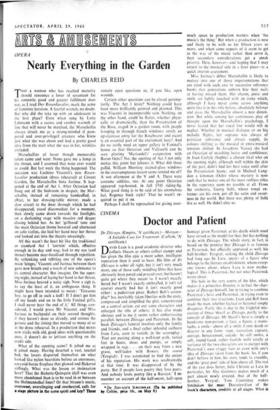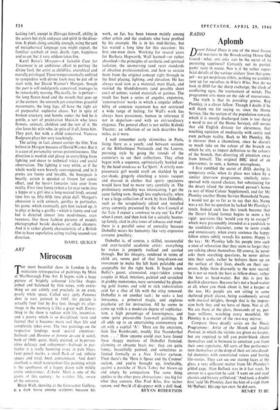CINEMA
Doctor and Patient
Dr Zhivago. (Empire, 'A' certificate.)—Moran- A Suitable Case for Treatment. (Carlton, 'A' certificate.) DAVID Lean is a good academic director who collects Oscars as others collect stamps and has given the film epic a more sober, intelligent reputation than it used to have. His film of Dr Zhivago is sober all right, but it isn't very much more, one of those sadly middling films that have obviously been pored and prayed over, but haven't quite got where they meant to. I wasn't exactly bored but I wasn't exactly enthralled, it isn't (of course) exactly bad but it isn't exactly good either: a pedestrian piece. Robert Bolt's screen- play* has inevitably taken liberties with the story, compressed and simplified the plot, concentrated on a central action, cut out some characters and enlarged the role of others; it has also made obvious and to me it seems rather embarrassing parallels between Zhivago and Pasternak. In the book Zhivago's funeral involves only the family and friends, and a final rather splendid outburst from Lara, soon to vanish; in the screenplay: `Feet are passing along a well-kept path, varied feet in boots, shoes and pumps, or simply wrapped in rags . . . on their way from a new grave, well-laden with flowers. On sound (Yevgraf): I was astonished to find the extent of his reputation. His work was unobtainable at that time. It was disapproved of by the party. But if people love poetry they love poets. And nobody loves poetry like a Russian.' I re- member an account pf the half-secret, half-open
• DR ZHIV AGO'S SCREENPLAY. (To be pablibed by Collins, price las., Go May 9.)
homage given Pasternak at his death which must have served as the model for that, but has nothing to do with Zhivago. The whole story, in fact, is based on the premise that Zhivago is as famous as Pasternak, but officially approved as well; his half-brother, Yevgraf, seeking the child Zhivago had long ago by Lara, speaks of a figure who belongs to the literary establishment, whom every- one knows about, whose Lara is now mytho- logical. This is Pasternak, but not what Pasternak wrote about.
The hole in the very centre of the film, which makes it a princeless Hamlet, is in fact the char- acter of Zhivago himself, for in trying to combine Pasternak's hero and Pasternak, in trying even to combine their two situations, Lean and Bolt have made the man, whether factual or fictional simply disappear. Partly this is due to the frightful mis- casting of Omar Sharif as Zhivago, partly to the concept of Zhivago. Mr Sharif's hero is simply a handsome non-person, a face, a figure, a mous- tache, a smile—above all a smile. Come death or disaster in any form—rape, starvation, capture, outrage, bereavement, suicide- - he still smiles, a soft, round-faced, rather foolish smile totally at variance (if the two characters are to merge) with Pasternak's own craggy face or even with one's idea of Zhivago taken from the book. So, if you don't believe in him, his story tends to crumble, and the 'great poet' side of him above all. The rest of the cast does better, Julie Christie as Lara in particular, Sir Alec Guinness makes much of a part almost newly created, that of the half- brother, Yevgraf; Tom Courtenay makes Strelnikov the most Dostoievskian of the book's characters, credible at all stages. What is
lacking isn't, except in Zhivago himself, ability in the actors but style and pace and spirit in the direc- tion. It plods along amiably enough, using the sort of metaphorical language you might expect, the familiar symbols of time, death, rape, happiness and soon; but it very seldom takes fire.
Karel Reisz's Morgan—A Suitable Case for Treatment is an ambitious effort to portray the divine fool, the artist as childlike, anarchical and morally privileged.Those temperamentally unfitted to sympathise with divine fools may be put off to start with, but David Warner's Morgan, though the part is self-indulgently conceived, manages to be remarkably moving. Physically, he is perfect— the long flaxen head and the mouth that goes up at the corners, the uncouth yet sometimes graceful movements, the long legs, all have the right air of purposeful, explosive chaos. Yet in spite of broken crockery and bombs under the bed he is gentle, a sort of proletarian Muisk in who loves flowers, animals, children and the rest of it. He also loves his wife who, in spite of it all, loves him. They part, but with a child conceived. Vanessa Redgrave plays her very touchingly.
The acting, in fact, almost carries the film. You believe in Morgan because of David Warner. But it is a case of personality versus pretentiousness. The direction is modish and glossy in everything from lighting and decor to technical tricks and social observation. The lighting is very white, as if the whole world were bravely over-exposed, and in it proles are funny and lovable, the bourgeois is beastly, action is speeded or frozen for comic effect, and the hero's fantasies take over from reality. First time funny (when a fat man turns into a hippo or a girl into a long-necked bird), second time less so, fifty-fifth time plain dull. Morgan's obsession is with animals, gorillas in particular, his game, which eventually gets him locked up, is to play at being a gorilla—which is funny and sad but is directed almost into modishness, even tweeness, like those fashion pictures of models photographed beside dockers or office cleaners. And it is rather glumly characteristic of a British film to have superlative acting trailing second-rate direction.
ISABEL QUIGLY











































 Previous page
Previous page